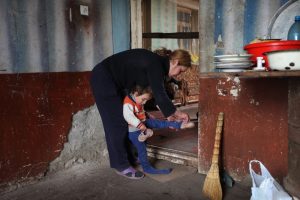Care
Volume 22, Issue 3, November 2014

Hasmik Josephan at home with one of her five children. Yegeghis, Armenia, 2011. Credit: Abbie Trayler-Smith
This issue of Gender & Development explores care from a gender perspective. Care is a social good; it not only sustains and reproduces society, but also underpins all development progress. Yet the vast majority of care work is done free, at home; and it is widely seen as a female responsibility. This gender division of labour has profound implications for women and girls – both in terms of their daily lives and options, and their status in society. Writers in this issue explore women’s experience of care work in different contexts from a feminist perspective, highlighting the impact that care work has for their lives, choices and wellbeing, and for the institutions of family, state and market – all of which lose out through unsustainable arrangements for care. Authors share innovative policy, advocacy and programme experience from different development organisations aiming to ensure care is shared more equitably. The goal is for care work to be divided fairly between the sexes, and between the household and other social institutions, including the state.
Contents
Gender & Development is published by Routledge. If you are interested in subscribing to the journal, please visit the Routledge website. (Please note the reduced subscription rates available for low and middle-income countries.)
For free access to the articles in the Care issue, please visit the Publications section of the Oxfam Policy & Practice website, and search the site using the article title or author name.
You can access the Introduction and Resources for the Care issue, free, below.
Editorial
Introduction to gender, development and care
Deepta Chopra and Caroline Sweetman
Articles
What is a transformative approach to care, and why do we need it?
Valeria Esquivel
What does care have to do with human rights? Analysing the impact on women’s rights and gender equality
Magdalena Sepúlveda Carmona and Kate Donald
Public policies on water provision and early childhood education and care (ECEC): do they reduce and redistribute unpaid work?
Marzia Fontana and Diane Elson
Policy advocacy for women’s unpaid care work: comparing approaches and strategies in Nepal and Nigeria
Deepta Chopra, Patience Ekeoba, Zahrah Nesbitt-Ahmed, Rachel Moussi and Mona Sherpa
Not ‘women’s burden’: how washing clothes and grinding corn became issues of social justice and development
Thalia Kidder, Zahria Mapandi and Hector Ortega
Transforming gender roles in domestic and caregiving work: preliminary findings from engaging fathers in maternal, newborn and child health in Rwanda
Kate Doyle, Jane Kato-Wallace, Shamsi Kazimbaya and Gary Barker
Valuing unpaid labour in community Fair Trade products: a Nicaraguan case study from The Body Shop International
Felicity Butler
Caring for people with intellectual disabilities in poor rural communities in Cambodia: experience from ADD International
Sylvie Cordier
Resources
Compiled by Liz Cooke
Views, events, and debates (subscriber-only access)
Edited by Liz Cooke
Book Reviews
Edited by Liz Cooke
Women & Conflict in the Middle East: Palestinian Refugees and the Response to Violence
Reviewed by Sophie Richter-Devroe
Love. A Question for Feminism in the Twenty-first Century
Reviewed by Sarah C. White
New Frontiers in Feminist Political Economy
Reviewed by Sarah Cook
Leftover Women: The Resurgence of Gender Inequality in China
Reviewed by Sally Sargeson
Gender, Violence and Human Security: Critical Feminist Perspectives
Reviewed by Jane Parpart
The Politics of the Body: Gender in a Neoliberal and Neoconservative Age
Deborah Eade
